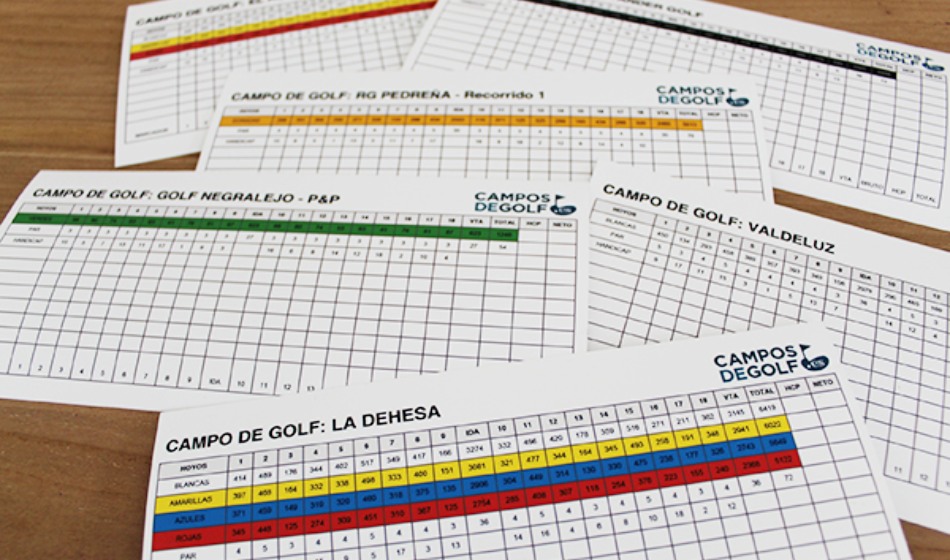
Golf Scoring: Guide to Counting Points
17 de February de 2024
The scoring in this sport is unique and may seem complex, but we are here to demystify it. Understanding how your performance is measured is key to improving your game and enjoying each round to the fullest. We will offer you a practical and simple guide so you can count your points like a professional. Whether you are a beginner eager to learn or an experienced player looking to refresh your knowledge, this guide is designed for everyone.
Dive with us into the world of golf and discover how each swing can bring you closer to victory. It’s time to turn those strokes into points and shine on the field with confidence and precision.
Fundamentals of Scoring in Golf
Understanding the scoring in golf is simpler than it seems. Each hole has a set number of strokes, known as par. Your goal is to complete each hole with the fewest strokes possible. The terms you need to know are birdie, eagle, and albatross. A ‘birdie’ is when you use one stroke less than par, an ‘eagle’ is two less, and an ‘albatross’, three less. On the other hand, if you exceed par, you will have a ‘bogey’ (one more) or a ‘double bogey’ (two more). The total score is calculated by adding the strokes from all the holes. In the end, the player with the fewest strokes wins. So, in golf, less is more.
A key aspect is honesty. In golf, players often keep their own score. Therefore, integrity is fundamental for the game to be fair. Remember that penalties can affect your score. The rules of golf establish penalties for lost balls or incorrect strokes. Stay alert to these situations to ensure your score is accurate.
With these concepts, you are ready to move forward and learn strategies to improve your score. Remember, constant practice and a deep knowledge of the rules are your best allies on the golf course.
How Strokes are Calculated in the Game
Understanding how strokes are calculated in golf is key to enjoying the game and improving your score. Each hole has an expected number of strokes, known as par. Your goal is to hole the ball with the fewest strokes possible. At the start, each player counts one stroke when hitting the ball. Whenever the ball is hit with the intention of advancing towards the hole, that counts as a stroke, even if the ball doesn’t move.
Strokes also include penalties. For example, if your ball is lost or ends up in a water hazard, additional strokes are added to your count. It’s vital to know the rules to avoid surprises on your scorecard.
If you go over the expected par, don’t worry. That’s called a bogey. If you manage fewer strokes than par, excellent! That’s known as a birdie or eagle, depending on how many strokes less. Here’s how each result is named:
- Albatross: Three strokes under par.
- Eagle: Two strokes under par.
- Birdie: One stroke under par.
- Par: The exact number of expected strokes.
- Bogey: One stroke over par.
- Double Bogey: Two strokes over par.
Remember to record each stroke and penalty to keep an accurate count. At the end of the round, add up all the strokes to get your total score. This way, you’ll know if you’re improving and where you need to practice more. Cheer up and perfect that swing!
Different Scoring Systems: Stroke Play and Match Play
In golf, the way points are counted varies depending on the scoring system used. Each has its rules and strategies. Today, we tell you about the two main ones: Stroke Play and Match Play.
Stroke Play, also known as medal play, is the most common and used in professional tournaments. Here, every stroke counts and the goal is to complete the course with the fewest strokes possible. It’s a test of consistency and precision, where each hole is a battle against par.
On the other hand, Match Play is a direct duel between players. The competition focuses on winning more holes than the opponent. The total number of strokes doesn’t matter, but being better hole by hole. It’s a game of mental endurance and tactics, where each hole is an opportunity for a comeback or to consolidate the advantage.
Here are some key differences between both systems:
- Stroke Play: It’s played against the field and the rest of the competitors, adding up all the strokes.
- Match Play: It’s played against a particular opponent, focusing on each individual hole.
- Stroke Play requires a conservative strategy, avoiding big mistakes.
- Match Play allows being more aggressive, seeking to win the hole even if it means risking.
Each scoring system in golf offers a unique experience and different challenges. Whether you prefer the meticulousness of Stroke Play or the intensity of Match Play, both enrich the game and test different skills. Ready to measure your strokes and face the challenge?
Tips to Improve Your Scorecard
Do you want to lower your golf score and shine on the field? Follow these practical tips and see how your scorecard reflects your progress.
- Know the course: Before playing, study the course. Familiarize yourself with the distances, obstacles, and greens. A good strategy starts with preparation.
- Practice putting: Putts represent almost half of the strokes in a round. Dedicate time to practice from different distances and angles. Precision on the green is crucial.
- Improve your swing: Work on your swing technique with a professional. A consistent and controlled swing will take you further than brute force.
- Manage your emotions: Keep calm and be patient. Golf is a game of mental endurance as much as physical skill.
- Proper equipment: Make sure your clubs are suitable for your style and skills. A golf fitting can make a big difference.
- Smart strategy: You don’t always need the driver. Sometimes, an iron will give you more precision and control. Think about each stroke.
- Record your rounds: Keep a detailed record of your games. Analyze your strengths and weaknesses to know where to focus your efforts.
With these tips, you’ll be on your way to improving your game and your scorecard in no time. See you on the field!
Common Mistakes and How to Avoid Them in Point Accounting
In golf, keeping track of your points is more than adding and subtracting. It’s easy to stray with common mistakes, but we’re here to help you avoid them. Pay attention to these tips and improve your accuracy in point accounting.
- Not recording every stroke: One of the most frequent errors is forgetting to count a stroke, especially when trying to get the ball out of an obstacle. To avoid this, maintain concentration and count every swing, no matter the situation.
- Confusion with penalties: The rules of golf establish specific penalties for situations like balls out of bounds or lost. Familiarize yourself with these rules and apply the penalties correctly to keep an accurate count.
- Not knowing the handicap: Your handicap can influence your final score. Make sure you understand how to calculate it and apply it in each round so that your results reflect your true ability.
- Errors in adding up: After a long day on the field, adding up incorrectly is a human error. Carry a pencil and note each stroke after playing each hole to keep a clear record and avoid mathematical errors at the end of the round.
- Forgetting golf etiquette: Respecting golf etiquette is essential, even when counting points. Do not interrupt other players or make them lose concentration. Courtesy fosters a fair and friendly playing environment.
Practice these tips and see how your point accounting improves match after match!
Understanding the scoring in golf is crucial for assessing your performance and enjoying each round to the fullest. Remember that in this sport, unlike many others, the goal is to keep the points as low as possible. Every stroke counts, and every hole is a new opportunity to improve.
Practice the accounting of your points accurately and see how, over time, you will not only understand your game better but also be able to set clearer goals for your development as a golfer. And don’t forget, golf is more than numbers; it’s strategy, patience, and enjoying the game.
Don’t get discouraged if your scores aren’t ideal at first. Golf is a sport of consistency and continuous learning. Enjoy each game and take scoring as a friend that helps you see your progress. See you on the field!
